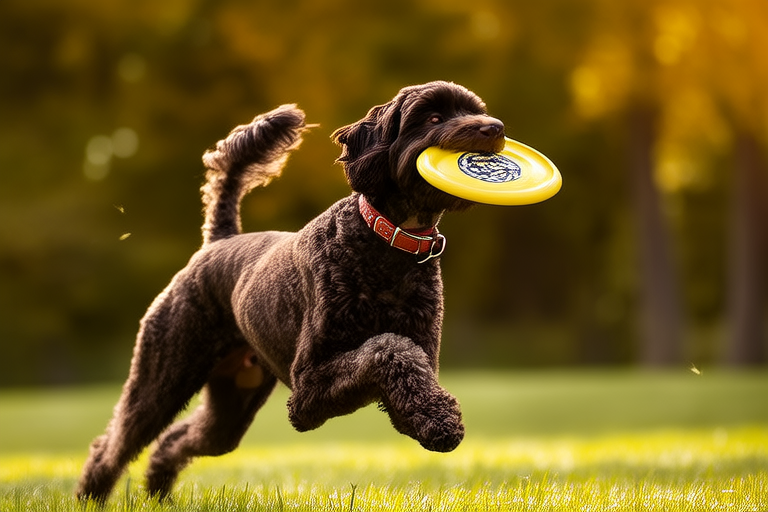Why Are Poodles So Obsessed With Fetch? Exploring Their Athletic Side
Poodles are often recognized for their elegance and intelligence, but beneath their sophisticated exterior lies an athletic dynamo. These dogs are known for their high energy levels and exceptional intelligence, traits that make them not only excellent companions but also ideal candidates for various sports and activities. This article delves into why poodles are so obsessed with fetch, exploring their rich history, innate instincts, and the science behind their athletic prowess.
The Intelligent and Energetic Nature of Poodles
Poodles are among the most intelligent breeds, ranking third in Stanley Coren’s book “The Intelligence of Dogs.” Their quick learning ability and problem-solving skills contribute to their popularity as service dogs and in competitive obedience. Alongside their intelligence, poodles have a remarkable amount of energy, which if not properly channeled, can lead to destructive behaviors. This combination makes fetch an ideal activity for them, offering both mental and physical stimulation.
A Brief History of Poodles: From Water Retrievers to Show Dogs
Originating in Germany, poodles were initially bred as water retrievers. Their dense, curly coat was designed to protect them from cold waters while hunting. Over time, they became popular across Europe, particularly in France, where they were used in circuses due to their trainability and agility. Despite their transformation into show dogs, poodles retained their athletic abilities, making them perfect for activities like fetch.
The Psychological Drive Behind Fetch: Instincts and Mental Stimulation
At the core of a poodle’s obsession with fetch is their instinctual drive. As descendants of water retrievers, they possess a strong prey drive and a natural inclination to chase and retrieve objects. This instinct is deeply ingrained, driving them to engage in activities that mimic their ancestral roles. Fetch provides an outlet for these instincts, allowing poodles to channel their energy into productive and enjoyable tasks.
In addition to their instinctual drive, fetch offers significant mental stimulation. Poodles thrive on challenges and enjoy solving problems. The game of fetch involves strategic thinking, such as calculating the best path to catch the object or determining the optimal moment to pounce. This mental engagement keeps their minds sharp and prevents boredom, which can otherwise lead to behavioral issues.
The Science Behind Fetch: Exercise Requirements and Physical Health
From a physiological standpoint, fetch aligns perfectly with a poodle’s exercise needs. According to Dr. Bonnie Beaver, a professor at Texas A&M University, dogs require approximately 30 minutes of exercise daily to maintain good health. Fetch provides a balanced form of exercise that combines cardiovascular fitness with strength training. Running after the ball builds stamina, while jumping and catching improve muscle tone and coordination.
Studies have shown that regular physical activity can significantly enhance a dog’s overall well-being. For instance, a 2018 study published in the Journal of Veterinary Behavior found that dogs engaged in consistent exercise routines exhibited fewer signs of anxiety and depression. Fetch, being a fun and interactive activity, not only meets their physical demands but also contributes positively to their emotional health.
Anecdotes and Studies Supporting Poodles’ Athletic Capabilities
Many anecdotes highlight the athletic potential of poodles. In agility trials, poodles consistently rank among the top performers. Their quick reflexes and agility allow them to navigate complex courses with ease. Additionally, poodles excel in flyball competitions, showcasing their speed and teamwork. These achievements underscore their natural talent for physical activities and their ability to learn and adapt to new challenges.
Scientific research further supports the athleticism of poodles. A 2019 study conducted by the American Kennel Club (AKC) analyzed the performance metrics of various dog breeds in agility trials. Poodles were noted for their precision and speed, outperforming many larger breeds in certain categories. This data reinforces the notion that poodles are not just intelligent but also physically capable of excelling in athletic pursuits.
Tips for Owners: Harnessing Fetch Enthusiasm for Positive Reinforcement Training and Bonding
To ensure that your poodle’s enthusiasm for fetch translates into positive reinforcement training and bonding experiences, consider the following tips:
- Start Early: Introduce fetch games to your poodle as early as possible to establish it as a routine activity. Early exposure helps in building a strong foundation for future training sessions.
- Use Positive Reinforcement: Reward your poodle with treats and praise when they successfully retrieve the object. This approach encourages them to associate fetch with positive outcomes, enhancing their motivation.
- Vary the Game: To prevent boredom, introduce different types of balls, frisbees, or toys. Varying the game keeps the activity exciting and mentally stimulating for your poodle.
- Make It a Social Activity: Engage in fetch games with friends or family members. Social interaction during playtime strengthens the bond between you and your poodle, fostering trust and cooperation.
- Monitor Exercise Levels: While fetch is beneficial, it’s essential to monitor your poodle’s exercise levels to avoid overexertion. Adjust the intensity and duration of the game based on their age, health, and individual energy levels.
By incorporating fetch into your daily routine, you not only satisfy your poodle’s physical and mental needs but also create lasting memories and strengthen your bond.
Conclusion
Poodles’ obsession with fetch is rooted in their deep-seated instincts, intelligence, and need for mental and physical stimulation. Their rich history as water retrievers and their ongoing success in various athletic events highlight their inherent athleticism. By understanding and harnessing this enthusiasm through positive reinforcement training and bonding activities, owners can ensure their poodles lead happy, healthy, and fulfilling lives.
Whether you’re a new owner looking to introduce your poodle to fetch or an experienced handler seeking new ways to challenge your pet, embracing this natural drive will enrich both your relationship and your poodle’s quality of life.
